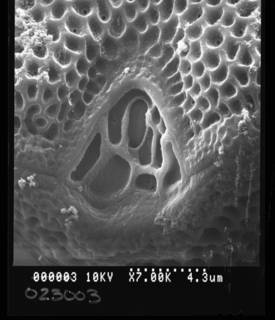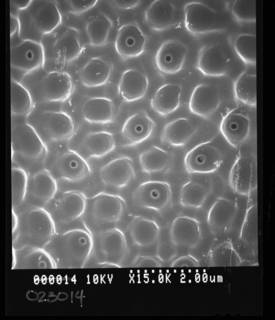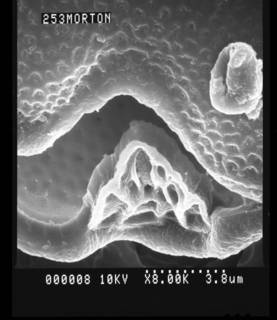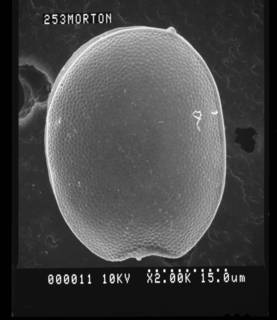
| Intro | | Search taxa | | Browse taxa | | Distributions | | Terminology | | References | | Statistics | | Online sources | | Tutorial | | Log in |
HABs taxon detailsProrocentrum concavum Y.Fukuyo, 1981
232461 (urn:lsid:marinespecies.org:taxname:232461)
accepted
Species
Prorocentrum arabianum Morton & Faust, 2002 · unaccepted (synonym)
marine,
Fukuyo Y. 1981. Taxonomical study on benthic dinoflagellates collected in coral reefs. Bull. Jap. Soc. Sci. Fish. 47: 967-978. [details]
Type locality contained in Ryukyu Islands
type locality contained in Ryukyu Islands [details]
Harmful effect Reported to produce OA, OA diol ester, DTX1 and FAT (Hu et al. 1993, Tindall et al. 1984, 1989). Quod et al. (1995) found...
Harmful effect Reported to produce OA, OA diol ester, DTX1 and FAT (Hu et al. 1993, Tindall et al. 1984, 1989). Quod et al. (1995) found that crude methanol extracts are not toxic to mice. [details] Identification Remarks: P. faustiae is extremely similar to P. concavum, having the same cell shape, surface ornamentation, size range,...
Identification Remarks: P. faustiae is extremely similar to P. concavum, having the same cell shape, surface ornamentation, size range, and pyrenoid. The differences described are mainly the number of periflagellar platelets. However, on the images provided only 8 or 9 platelets are visible. The marginal pores mentioned in the original description is not a convincing difference. This species is in need of morphological reinvestigation to clarify whether it is conspecific with P. concavum, making it a synonym. In the light microscope free-swimming cells cannot be distinguished from Prorocentrum malayense, a species that can co-occur (Verma et al. 2019). Verified rDNA sequences (SSU, LSU) are: [details] Taxonomic remark P. faustiae has been synonymized with P. concavum by Chomérat et al. (2019)
Taxonomic remark P. faustiae has been synonymized with P. concavum by Chomérat et al. (2019) [details]
Guiry, M.D. & Guiry, G.M. (2024). AlgaeBase. World-wide electronic publication, National University of Ireland, Galway (taxonomic information republished from AlgaeBase with permission of M.D. Guiry). Prorocentrum concavum Y.Fukuyo, 1981. Accessed through: Lundholm, N.; Churro, C.; Escalera, L.; Fraga, S.; Hoppenrath, M.; Iwataki, M.; Larsen, J.; Mertens, K.; Moestrup, Ø.; Murray, S.; Tillmann, U.; Zingone, A. (Eds) (2009 onwards) IOC-UNESCO Taxonomic Reference List of Harmful Micro Algae at: https://www.marinespecies.org/hab/aphia.php?p=taxdetails&id=232461 on 2024-05-02
Lundholm, N.; Churro, C.; Escalera, L.; Fraga, S.; Hoppenrath, M.; Iwataki, M.; Larsen, J.; Mertens, K.; Moestrup, Ø.; Murray, S.; Tillmann, U.; Zingone, A. (Eds) (2009 onwards). IOC-UNESCO Taxonomic Reference List of Harmful Micro Algae. Prorocentrum concavum Y.Fukuyo, 1981. Accessed at: https://www.marinespecies.org/hab/aphia.php?p=taxdetails&id=232461 on 2024-05-02
Date action by
original description
Fukuyo Y. 1981. Taxonomical study on benthic dinoflagellates collected in coral reefs. Bull. Jap. Soc. Sci. Fish. 47: 967-978. [details]
original description (of Prorocentrum arabianum Morton & Faust, 2002) Morton S.L., Faust M.A., Fairey E.A. & Moeller P.D.R. 2002. Morphology and toxicology of <i>Prorocentrum arabianum</i> sp. nov., (Dinophyceae) a toxic planktonic dinoflagellate from the Gulf of Oman, Arabian Sea. Harmful Algae 1: 393-400. [details] taxonomy source Chomérat, N.; Bilien, G.; Zentz, F. (2019). A taxonomical study of benthic Prorocentrum species (Prorocentrales, Dinophyceae) from Anse Dufour (Martinique Island, eastern Caribbean Sea). <em>Marine Biodiversity.</em> 49(3): 1299-1319., available online at https://doi.org/10.1007/s12526-018-0913-6 [details] additional source Hoppenrath, M.; Chomérat, N.; Horiguchi, T.; Schweikert, M.; Nagahama, Y.; Murray, S. (2013). Taxonomy and phylogeny of the benthic Prorocentrum species (Dinophyceae)—A proposal and review. <em>Harmful Algae.</em> 27: 1-28., available online at https://doi.org/10.1016/j.hal.2013.03.006 [details] additional source Verma A., Kazandjian A., Sarowar C., Harwood D.T., Murray J.S., Pargmann I., Hoppenrath M. and Murray S.A. (2019). Morphology and phylogenetics of benthic Prorocentrum species (Dinophyceae) from tropical northwestern Australia. <em>Toxins 11: 571.</em> [details] additional source Aikman K.E., Tindall D.R. & Morton S.L. 1993. Physiology and potency of the dinoflagellate <i>Prorocentrum hoffmanianum</i> during the complete growth cycle. In: <i>Toxic Phytoplankton Blooms in the Sea</i> (Ed. by T.J. Smayda & Y. Shimizu), pp. 463-468, Elsevier, New York. [details] additional source Guiry, M.D. & Guiry, G.M. (2023). AlgaeBase. <em>World-wide electronic publication, National University of Ireland, Galway.</em> searched on YYYY-MM-DD., available online at http://www.algaebase.org [details] additional source Tomas, C.R. (Ed.). (1997). Identifying marine phytoplankton. Academic Press: San Diego, CA [etc.] (USA). ISBN 0-12-693018-X. XV, 858 pp., available online at http://www.sciencedirect.com/science/book/9780126930184 [details] additional source Moestrup, Ø., Akselman, R., Cronberg, G., Elbraechter, M., Fraga, S., Halim, Y., Hansen, G., Hoppenrath, M., Larsen, J., Lundholm, N., Nguyen, L. N., Zingone, A. (Eds) (2009 onwards). IOC-UNESCO Taxonomic Reference List of Harmful Micro Algae., available online at http://www.marinespecies.org/HAB [details] additional source Hoppenrath, M.; Murray, S. A.; Chomérat, N.; Horiguchi, T. (2014). Marine benthic dinoflagellates - unravelling their worldwide biodiversity. <em>Kleine Senckenberg-Reihe.</em> 54: 1-276. (look up in IMIS) [details] toxicology source Hu T., deFreitas A.S.W., Doyle J., Jackson D., Marr J., Nixon E., Pleasance S., Quilliam M.A., Walter J.A. & Wright J.L.C. 1993. New DSP toxin derivatives isolated from toxic mussels and the dinoflagellates, <i>Prorocentrum lima</i> and <i>Prorocentrum concavum</i>. In: <i>Toxic Phytoplankton Blooms in the Sea</i> (Ed. by T.J. Smayda & Y. Shimizu), pp. 507-512. Elsevier, New York. [details] toxicology source Quod J.P., Turquet J., Diogene G. & Fessard V. 1995. Screening of extracts of dinoflagellates from coral reefs (Reunion Island, SW Indian Ocean), and their biological activities. In: <i>Harmful Marine Algal Blooms</i> (Ed. by P. Lassus, G. Arzul, E. Erard-Le Denn, P. Gentien & C. Marcaillou-Le Baut). pp. 815-820. Lavoisier, Paris. [details]  Present Present  Inaccurate Inaccurate  Introduced: alien Introduced: alien  Containing type locality Containing type locality
From regional or thematic species database
Description Broad oval to ovoid cells with central pyrenoid (starch ring). Reticulatefoveate thecal surface with scattered pores becoming more dense towards the margin. Plate centre devoid of pores and in some cells also devoid of depressions. The periflagellar area is V-shaped and a small platelet list can be present in some cells. Eight or nine platelets. The round to oval nucleus is located posteriorly. [details]Harmful effect Reported to produce OA, OA diol ester, DTX1 and FAT (Hu et al. 1993, Tindall et al. 1984, 1989). Quod et al. (1995) found that crude methanol extracts are not toxic to mice. [details] Identification Remarks: P. faustiae is extremely similar to P. concavum, having the same cell shape, surface ornamentation, size range, and pyrenoid. The differences described are mainly the number of periflagellar platelets. However, on the images provided only 8 or 9 platelets are visible. The marginal pores mentioned in the original description is not a convincing difference. This species is in need of morphological reinvestigation to clarify whether it is conspecific with P. concavum, making it a synonym. In the light microscope free-swimming cells cannot be distinguished from Prorocentrum malayense, a species that can co-occur (Verma et al. 2019). Verified rDNA sequences (SSU, LSU) are: [details] Synonymy P. faustiae has been synonymized with P. concavum by Chomérat et al. (2019) [details] Taxonomic remark P. faustiae has been synonymized with P. concavum by Chomérat et al. (2019) [details]
Published in AlgaeBase
 Published in AlgaeBase  (from synonym Prorocentrum arabianum Morton & Faust, 2002) (from synonym Prorocentrum arabianum Morton & Faust, 2002)To Barcode of Life (1 barcode) (from synonym Prorocentrum arabianum Morton & Faust, 2002) To Biodiversity Heritage Library (5 publications) To European Nucleotide Archive (ENA) To European Nucleotide Archive (ENA) (from synonym Prorocentrum arabianum Morton & Faust, 2002) To GenBank (3 nucleotides; 1 proteins) (from synonym Prorocentrum arabianum Morton & Faust, 2002) To GenBank (33 nucleotides; 0 proteins) To NMNH Extant Collection (023003.jpg) To NMNH Extant Collection (023014.jpg) To NMNH Extant Collection (253008.jpg) (from synonym Prorocentrum arabianum Morton & Faust, 2002) To NMNH Extant Collection (253011.jpg) (from synonym Prorocentrum arabianum Morton & Faust, 2002) To ITIS |




